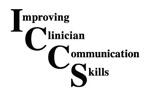 Improving Clinician Communication Skills
Improving Clinician Communication Skills
Principal Investigator: JR Curtis
Research Grant: National Institute of Health / NINR, April 2007 to March 2012
The primary aim of this study is to evaluate the effectiveness of a communication skills intervention to improve end-of-life care delivered by internal medicine residents and nurse practitioner students. The primary outcome measure is the Quality of Communication (QOC) questionnaire developed by our research team and completed by patients and family members. As secondary outcomes, we will examine the effect of the intervention on patients’ self-reported symptoms and on the overall quality of end-of-life care provided by residents and NP students, as assessed by patients, families and nurses. There are also two secondary aims: 1) to assess the implementation of the intervention by measuring trainees’ knowledge, attitudes, and behaviors around end-of-life care using process measures, including a validated knowledge test and attitudes survey, standardized patients, trainee self-assessment, and faculty assessment and 2) to examine trainee factors that facilitate or impede the effectiveness of the communication intervention on improving end-of-life care as assessed with both process and outcome measures.
clinicaltrials.gov: http://clinicaltrials.gov/ct2/show/NCT00687349
Publications from this study include:
Ford DW, Downey L, Engelberg R, Back AL, Curtis JR. Association between Physician Trainee Self-Assessments in Discussing Religion and Spirituality and Their Patients’ Reports. J Palliat Med. 2014 Apr;17(4):453-62. Epub 2014 Mar 20.
Long AC, Engelberg RA, Downey L, Kross EK, Reinke LF, Cecere Feemster L, Dotolo D, Ford DW, Back AL, Curtis JR. Race, income, and education: associations with patient and family ratings of end-of-life care and communication provided by physicians-in-training. J Palliat Med. 2014 Apr;17(4):435-47. Epub 2014 Mar 4.
Curtis JR, Back AL, Engelberg RA. Training for effective patient communication–reply. JAMA. 2014 Apr 2;311(13):1356-7.
Curtis JR, Back AL, Ford DW, Downey L, Shannon SE, Doorenbos AZ, Kross EK, Reinke LF, Feemster LC, Edlund B, Arnold RW, O’Connor K, Engelberg RA. Effect of communication skills training for residents and nurse practitioners on quality of communication with patients with serious illness: a randomized trial. JAMA. 2013 Dec 4;310(21):2271-81.
Bays AM, Engelberg RA, Back AL, Ford DW, Downey L, Shannon SE, Doorenbos AZ, Edlund B, Christianson P, Arnold RW, O’Connor K, Kross EK, Reinke LF, Feemster LC, Edwards K, Alexander SC, Tulsky JA, Curtis JR. Interprofessional communication skills training for serious illness: evaluation of a small-group, simulated patient intervention. J Palliat Med. 2014 Feb;17(2):159-66. Epub 2013 Nov 1.
Dickson RP, Engelberg RA, Back AL, Ford DW, Curtis JR. Internal medicine trainee self-assessments of end-of-life communication skills do not predict assessments of patients, families, or clinician-evaluators. J Palliat Med. 2012 Apr;15(4):418-26. Epub 2012 Apr 4.
Ford DW, Downey L, Engelberg R, Back AL, Curtis JR. Discussing religion and spirituality is an advanced communication skill: an exploratory structural equation model of physician trainee self-ratings. J Palliat Med. 2012 Jan;15(1):63-70. Epub 2012 Jan 13.
Billings ME, Engelberg RA, Curtis JR, Block S, Sullivan AM. Determinants of medical students’ perceived preparation to perform end-of-life care, quality of end-of-life care education, and attitudes toward end-of-life care. J Palliat Med. 2010 Mar;13(3):319-26.
Billings ME, Curtis JR, Engelberg RA. Medicine residents’ self-perceived competence in end-of-life care. Acad Med. 2009 Nov;84(11):1533-9.
